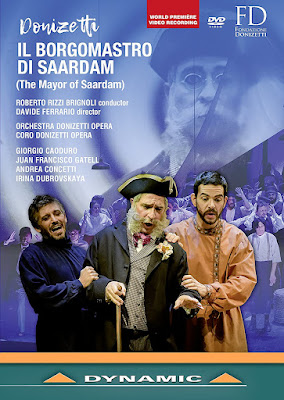Which is better, Cav or Pag? is a question that has presumably been endlessly hashed out, although I personally have never been involved in the debate. And I don't think I'd be very useful, either; I really, really just can't decide. It could easily go either way. They're both great.
But what I DO know is that, even though they were both one-hit wonders, Mascagni had a much more successful composing career than Leoncavallo. Even if they didn't have lasting success, the former's operas were consistently popular in their time, and some of them are still performed semi-regularly today. More than we can say for Leoncavallo. I suppose his other stage works are probably done somewhere sometimes maybe, but sure as heck not often. I'm pretty sure this is the first of his non-Pag works to ever appear on video. Nuts!
It's a kind of standard opera plot, and you certainly would recognize Leoncavallo as a contemporary of Puccini: Zazà is a star singer; she was raised from poverty by Cascart, another singer and her lover as we open. But that doesn't last; she's kind of had enough of him, and she's in love with another dude, Dufresne. So they become lovers--Cascart, atypically, more or less accepts this, in spite of issuing dire warnings about Dufresne's character--but he's always having to go off to Paris, and this is because he has a wife and daughter. So Zazà breaks up with him even though it breaks her heart, and that's that. Nobody dies here, which is of course quite unusual in this sort of thing, but apart from that...yeah, you've seen it before. The obvious parallel is to Madama Butterfly, except for the lack of pregnancy or death. Honestly, in the long run, it's not going to be that big a deal. I briefly entertained fantasies that she was going to realize how much better off she is without these destructive attachments and just start living her own best life, but that might be a bit much to hope for.
It's really good, though. There are parts that drag a bit, but there's also a lot of real passion, and even if Zazà's attachment to Dufresne is unconvincing at first, the narrative makes it work by sheer persistence. There's also a lot of stuff with secondary characters, other performers, flitting about, creating a believable backstage world. I was a bit wary of what the production would be like, because it's by Christof Loy, who also did that Les vêpres siciliennes which made some good but also quite a lot of bad choices. What to expect? Well, credit where due: he's on his best behavior. There is nothing Eurotrashy or Regietheatrical here. Apart from somewhat modernized costumes, this very faithfully follows the libretto, and its world of backstages and dressing rooms is very well-done. Also, huge credit to Svetlana Aksenova in the title role. She puts on a hell of a performance, both acting- and singing-wise. It was quite unexpected to see her here; I've seen her as the lead in two Rimsky-Korsakov operas (Tsar Saltan and The Invisible City), but I didn't know she had an international presence. Good! We've also got Christopher Maltman as Cascart, his voice as booming as ever, though I have to say, his character is kind of an unlikeably smug douchebag. Nikolai Schukoff is appropriately Pinkertonian as Dufresne.
Honestly, I'd easily say this is, at any rate, better than any of the post-Cav Mascagni operas I've seen. I really want to see Leoncavallo's La bohème. It could happen. It's not inconceivable. But the reason we don't must at least partially be the same reason we never see any of the dozens of other clemenzas di Tito. The better-known composer has sucked the air out of the room, and some portion of the audience would probably end up confused and annoyed that it's not the more famous work. But do it anyway! I really want you to!



















